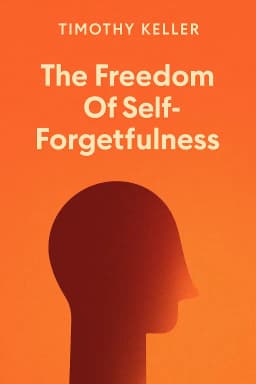
The Visioneering Paradox
Golden Hook & Introduction
SECTION
Daniel: Most people think a big vision starts with a bold first step. What if it actually starts with a dead stop? With doing absolutely nothing? Sophia: That’s a terrifying thought for anyone who’s ambitious. The idea that the best move is no move at all? It feels completely wrong. Daniel: It feels wrong, but that's the paradox we're exploring today. It’s the counter-intuitive heart of the book Visioneering by Andy Stanley. Sophia: Right, and Stanley is in a unique position to talk about this. He's not just a theorist; he founded and leads North Point Ministries, a massive network of churches that started from scratch. So when he talks about building something from nothing, he’s speaking from decades of very real, very complex experience. Daniel: Exactly. And he argues that the process is far more spiritual and patient than most people imagine. He even coins the term "Visioneering" to describe it. And it all begins not with a brilliant idea, but with something much heavier.
The Anatomy of a God-Given Vision: More Waiting Than Working
SECTION
Daniel: Stanley’s core definition is that a vision is "a clear mental picture of what could be, fueled by the conviction that it should be." But the key is where it originates. It doesn't start as a cool idea you brainstorm on a whiteboard. It starts as a burden. Sophia: A burden? That sounds so negative. Like something you’re stuck with. Daniel: He frames it as a holy discontent. It’s that feeling you get when you see a gap between the world as it is and the world as it ought to be. The primary example he uses throughout the book is the biblical story of Nehemiah. Here’s this guy, a high-ranking official serving the king of Persia, living a comfortable life. Then he gets news from his homeland, Jerusalem. The city walls are rubble, the gates are burned, and his people are living in disgrace and danger. Sophia: And he can’t shake it. Daniel: He can't shake it. The book says he "wept and mourned for days." That's the burden. It’s not an opportunity he spotted; it’s a problem that broke his heart. And this is where the first paradox kicks in. Nehemiah, with all his influence and passion, doesn't immediately draft a 10-point plan and rush off to Jerusalem. Sophia: What does he do? Daniel: He waits. For four months, he does his job, serves the king, and prays. This is Stanley's first, and maybe most challenging, building block for visioneering: a clear vision doesn't mean you have a green light. Sophia: Okay, but let's be real. 'Waiting for God's timing' can sound a lot like a spiritual excuse for procrastination. How do you know the difference between patient preparation and just being scared to start? Daniel: That is the essential question. Stanley argues it’s the difference between passive waiting and productive waiting. He gives a personal example that’s really telling. For years, while he was a youth pastor with no plans to start his own church, he spent his spare time writing a detailed constitution for a hypothetical church. He outlined its governance, its structure, everything. He was preparing for a future he couldn't even see yet. Sophia: So he was building the ark before there was any sign of rain. Daniel: Exactly! Stanley says three crucial things happen in that waiting period. First, the vision itself matures. It gets clearer, sharper. Second, you mature. God is preparing you for the weight of the vision. Moses had the vision to free his people, acted too soon, and ended up in the desert for forty years of character development. The vision was right; the man wasn't ready. Sophia: And the third thing? Daniel: God is preparing the circumstances. While you're waiting, praying, and planning, He's working behind the scenes. Stanley has this great little story about looking for shark teeth at the beach with his family. He’d walked the beach all week and seen nothing. Then his brother-in-law comes, announces he's going to find shark teeth, and returns with a handful. Stanley's realization was profound: "We see what we are looking for." He says prayer during the waiting period doesn't force God's hand; it sensitizes your eyes. You start seeing the opportunities—the shark teeth—that were there all along. Sophia: Ah, so it’s not passive waiting, it’s active preparation. You're not just sitting around; you're building the tools, sharpening your skills, and scanning the horizon. That reframes it completely. It’s a period of intense, quiet focus before the storm of execution. Daniel: Precisely. And you need that focus, because once you do get the green light to move, the nature of the challenges changes dramatically.
The Price of the Pursuit: Battling Critics, Distractions, and Yourself
SECTION
Daniel: And once you start moving, that's when the real price becomes clear. Stanley is very direct that any vision worth having will cost you, and it's usually not just money or time. The first bill that comes due is often sacrifice. Sophia: Giving something up. Daniel: And not just something bad. He says you often have to give up the actual good for the potential best. He tells this incredibly vulnerable story about his early career. He was a passionate musician and had built up a home recording studio in his basement. It was his escape, his passion. But as his kids got older, he realized he was facing a choice: time with his family or time in his studio. Sophia: You can’t be in two places at once. Daniel: Right. He had a vision for the kind of father he wanted to be, and that vision was in direct conflict with his music. So, he made the painful decision to sell every piece of his gear. He sacrificed a good thing he loved for the better thing he envisioned for his family. That’s the kind of cost he’s talking about. Sophia: That's a gut-punch of a story. It highlights a key tension. But what about the external costs, like criticism? Stanley says visions are magnets for criticism. Why is that, and how does he suggest we handle it without getting derailed? Daniel: He gives two main reasons. First, visions inherently challenge the status quo. People who are comfortable with the way things are will feel threatened. Second, visions almost always have gaps. You know the 'what'—the destination—but the 'how' is often fuzzy at the start. Critics love to attack those gaps. Sophia: Because it’s easier to poke holes in a plan than it is to build one. Daniel: Exactly. And he goes back to Nehemiah. As soon as Nehemiah and the people start rebuilding the wall, his critics—these two local officials named Sanballat and Tobiah—show up. First, they mock him. "What is this feeble thing you are doing? If even a fox climbed up on it, he would break down their wall of stones!" They’re attacking the gaps, the perceived weakness of the plan. Sophia: So what does Nehemiah do? Does he post a fiery rebuttal on his ancient Israelite social media? Daniel: He does the opposite. He doesn't engage them at all. His response is threefold, and it’s a masterclass in handling criticism. First, he prays. He hands the emotional burden over to God. Second, he remembers his mission. He reminds himself and the people why they are doing this. And third, when the threats escalate from mockery to violence, he revises his plan. He doesn't abandon the vision; he adapts the strategy. He arms the builders. Half the men worked while the other half stood guard with spears and shields. Sophia: He didn't let the criticism change the vision, but he did let it improve the plan. Daniel: Perfectly put. And when the critics tried to lure him away for a "meeting" in the plains—a classic distraction tactic—he sends back one of the most powerful lines in leadership literature: "I am doing a great work and I cannot come down." Sophia: I love that line. It’s not defensive; it’s just focused. It’s a powerful way to deal with distractions, whether it's criticism or even a 'good' opportunity that isn't the main thing. It’s the ultimate statement of priority. Daniel: It is. And that intense focus on the 'great work' leads to Stanley's most profound and, I think, most important point. The ultimate goal isn't just completing the vision; it's about the person you become in the process.
The Leader's Mandate: Moral Authority and the 'Inexplicable Life'
SECTION
Daniel: That focus on the 'great work' leads directly to this idea. Stanley argues that for a vision to have lasting impact, the leader's influence is everything. And sustained influence comes from one thing: moral authority. Sophia: Okay, 'moral authority' can sound a bit lofty or old-fashioned. What does that actually look like in practice? Is it just about not messing up publicly? Daniel: It's much deeper than that. He defines it as the credibility you earn when your actions consistently align with your convictions. It's the visible proof that you walk your talk. And he argues it's more powerful than any position or title. He again points to Nehemiah, who was the official governor of Judah. As governor, he was entitled to a hefty food allowance, basically a tax on the people to support his household. All the governors before him had taken it. Sophia: It was his right. An executive perk. Daniel: It was. But Nehemiah refused it. For twelve years, he paid for his own expenses out of his own pocket. He did this because the people were already poor and struggling. It was a quiet, consistent sacrifice. But later, when he discovered that the wealthy nobles were exploiting the poor through predatory lending, he had to confront them. And because he had spent twelve years building moral authority, when he stood up and called them out, they had nothing to say. He had the moral high ground. His influence was unassailable. Sophia: Because he had already paid a price they weren't willing to pay. His sacrifice gave him the standing to demand sacrifice from others. Daniel: Precisely. And this leads to Stanley's most radical rule: Abandon the vision before you abandon your moral authority. There will be moments where cutting a moral corner seems like the only way to save the project. Stanley says that’s the moment you have to be willing to let the project die. Sophia: Wow. That's a radical idea. So the vision is secondary to your integrity. This connects to what he calls the 'inexplicable life,' right? The idea that the way you live—with peace, with character—is what ultimately draws people in, more than the success of the project itself. Daniel: Yes, that's the ultimate endgame. The vision is the stage, but your character is the play. Stanley believes God uses the vision to put you on display. When people see you handle pressure with grace, or success with humility, or a crisis with unexplainable peace, they stop asking about your five-year plan and start asking about your source. He tells a story about a friend, Jimmy, who had been sharing his faith with a coworker, Gill, for nine years. Gill never converted, but he kept the conversation going. When asked why, Gill said, "Because Jimmy has something I want. He has peace." Sophia: The product wasn't the belief system; it was the peace that came from it. The life itself was the most compelling argument. Daniel: That's it. The vision—whether it's building a business, raising a family, or rebuilding a wall—becomes the vehicle through which God accomplishes His parallel plan: to shape you into someone whose life doesn't make sense without Him.
Synthesis & Takeaways
SECTION
Sophia: So, when we pull it all together, Visioneering isn't really a 'how-to' guide for worldly success, is it? It’s a blueprint for a life of purpose, where the journey of building something external is really about forging your internal character. Daniel: That's the perfect summary. The book has been so well-regarded in Christian leadership circles for exactly that reason. It reorients the goal. The final product of a God-ordained vision isn't the rebuilt wall or the successful company. It's the person who, at the end of it all, can look back and see God's hand not just in the outcome, but in their own transformation. As Stanley concludes, everyone ends up somewhere in life. Visioneering is about ending up somewhere on purpose. Sophia: A powerful thought to leave our listeners with. What's one question they could ask themselves this week to start this process? Daniel: Simple. Stanley suggests starting with a burden. So the question is: What breaks your heart? What problem in your world, big or small, creates a tension between 'what is' and 'what should be'? That's often where a vision is born. Sophia: I love that. A great place to start. Daniel: It’s a journey worth taking. Sophia: This is Aibrary, signing off.









